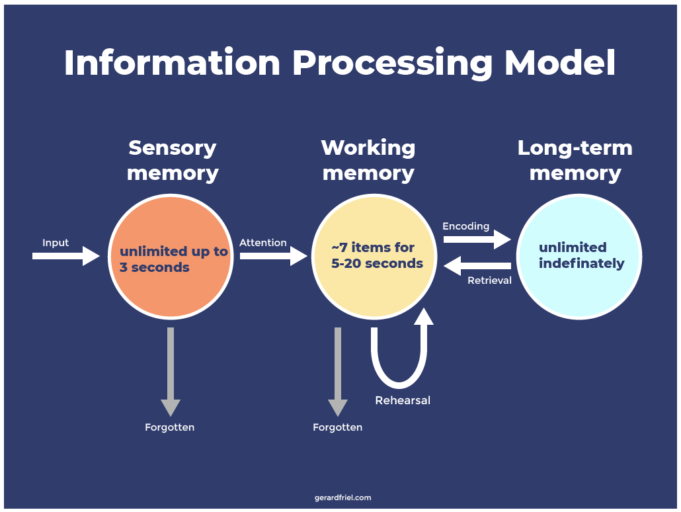Strategies for processing information into long-term memory.
What is Cognitivism?
Cognitivism is a learning theory that is focused on what goes on inside a person’s mind, as opposed to Behaviourism which is based on what a person does. Cognitivism was initially viewed via Jean Piaget’s views on schema (organisation and referencing) and subsequently via the ‘Information Processing Model’.
Piaget declared that a person processes new information through assimilation and accommodation. Assimilation is taking new knowledge and slotting it in and amongst existing knowledge and building a schema that organises this related information. Later, accommodation occurs when this organised schema is updated to absorb new incoming knowledge.
How incoming information is processed in the mind is shown below through the Information Processing Model:

Why is Cognitivism useful to trainers?
The brain contains three memory types: sensory, short-term (or working) and long-term. The trainer’s role is to help the learner transfer knowledge through to long-term memory and ensure that it can be recalled via retrieval methods. By understanding how learners process information, the trainer can utilise strategies to assist this learning process.
How can I use Cognitivism strategies?
By using Cognitivism, you are essentially teaching your learners how to learn. There are a number of strategies and tools that can support the learning process and build schemas:
- Advanced organisers
- Visual aids
- Mind mapping tools
- Mnemonics and acronyms
- Analogies and metaphors
- Chunking content into smaller parts and reviewing
- Repetition and practiced retrieval
- Q & A sessions
- Meaningful and contextualized content
- Worked examples
By using these strategies, you provide your learners with the tools to enhance their learning process and build retrieval mechanisms for newly acquired skills and knowledge.
Review

Pros: Provides insight into how people learn and tools to aid this process.
Cons: Can be teacher-centric if not delivered in a collaborative environment.
Related reading: Behaviourism, Constructivism, Connectivism, Instructional Design, Merrill
